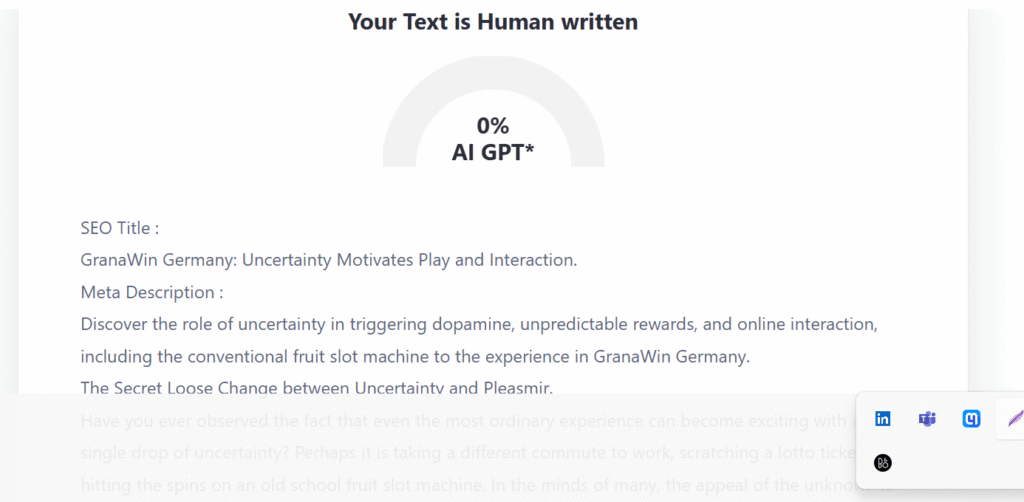The Secret Loose Change between Uncertainty and Plasmid.

Have you ever observed the fact that even the most ordinary experience can become exciting with a single drop of uncertainty? It may be taking a different commute to work, scratching a lottery ticket, or hitting the spins on an old-school fruit slot machine. In the minds of many, the appeal of the unknown is not merely the product–it is the emotional experience of the process. This relationship of uncertainty and pleasure is deeply integrated into our cognitive structure and behaviour patterns, and it has a profound effect on both our real and online lives.
Why Uncertainty Is Still on our Radar.
Human beings are programmed to desire something new. Our mind is always making predictions, and once these predictions are put to the test, dopamine —the feel-good neurotransmitter —gets to work. The trigger of that short spurt is what makes uncertainty so attractive. Consider this: even picking something to have for dinner can be shockingly pleasing when the outcome is a little unpredictable. Psychologists refer to this as a dopamine loop, as the brain is a rewarding area to explore and anticipate.
This principle is exploited in digital spaces, such as GranaWin Germany. Their games incorporate minimal amounts of randomness that capture the attention of their players without overexertion. It is not winning that is thrilling, but the dance of anticipation, suspense, and the delightful surprise that comes now and then.
The Science of Pleasure and Surprise.
Uncertainty activates the brain’s reward circuits at a neurological level. The nucleus accumbens, a key component of the brain’s reward system, is activated when we experience an unexpected outcome. This response occurs similarly when we try a new taste, are surprised by an app, or when we observe a very close call in a slot machine.
Psychologists refer to this as variable rewards, a situation where random, unpredictable rewards create a greater degree of engagement compared to predictable rewards. That is why, when one narrowly misses a win in a traditional fruit slot machine, it is almost as satisfying as winning an actual game — the brain is left wondering what the next step will be, and the behaviour is strengthened subtly by the hint of tension and relief.
These same principles apply even outside the gaming industry, explaining why digital engagement can be so addictive. Instant gratification, as well as unpredictable consequences, are all used to retain attention through social media notifications, surprise discounts, and gamified applications. This is directly connected to cognitive bias in behavioural economics: we place too much value on small, uncertain rewards since our brains are designed to find novelty and avoid staleness.
Lessons from Classic Games
Uncertainty is not a digital creation; it has been part of human experience for centuries. An ideal example of how a lack of predictability creates pleasure is the classic fruit slot machine, with its simple play and colourful slot reels. They are not complicated, but they have a subtle tension with each spin.
These types of machines are operated using varying reward schedules, where a player will sometimes win and most of the time, the outcome of the spins will be unknown. This is what makes the experience interesting and not boring. Even a near-miss, when the symbols are almost crashing into each other, stimulates dopamine, an association that suggests unpredictability is also beneficial in its own right.
| Level of Uncertainty | Emotional Response | Example in Daily Life | Example in Gaming |
| Low | Mild interest | Reading a familiar story | Classic fruit slot machines |
| Moderate | Excitement, anticipation | Lottery scratch tickets | GranaWin Germany digital slots |
| High | Thrill, suspense | Mystery boxes, surprise events | New, unpredictable online games |
Nothing is certain in the Digital World.
The principles of uncertainty are taken to a whole new level by modern digital platforms. Games and applications utilise advanced mechanics to maintain the user’s attention, with a high likelihood of exploiting minor behavioural patterns without seeming to manipulate the user. An example is GranaWin Germany, which incorporates random rewards and amusing visuals that generate a feeling of surprise and provide stimulus for attention and fulfilment.
It has nothing to do with the direct gambling effect but with decision fatigue and brain stimulation. Unpredictability in a time of constant digital output is like a grain of sand that breaks the tediousness, makes the brain active, and strengthens the engagement via dopamine loops. Gamified features, instant feedback, and customizable rewards all contribute to an even greater sense of fun, with no actual consequences.
Expert Perspectives
Both cognitive psychologists and behavioural economists note that pleasure tends to flourish between certainty and mayhem. Excess predictability can lead to boredom, while excessive unpredictability can result in stress. Moderate uncertainty is the sweet spot because expectation, interest, and excitement of what could happen meet.
According to cognitive scientist Lena Hoffmann:
It is our brain itself that is designed to find patterns, and the mind needs a jolt of expectation from time to time. That interruption is also enjoyable by nature, and it can be the reason why some games, experiences, or digital interactions are so engaging despite having low stakes.
This principle is implemented on platforms such as GranaWin Germany. By incorporating uncertainty into their lives in small, well-paced doses, they can generate moments of joy, which leverage some of the fundamentals of thought and emotion — and this does not require them to take risks.
This paper discusses the integration of uncertainty and enjoyment from psychological, neurological, and digital perspectives. Moderate uncertainty is a slight stimulus, creating a slight incentive in our brains, making gameplay more interesting and our experience more gratifying, whether classic or contemporary, with digital interaction.

